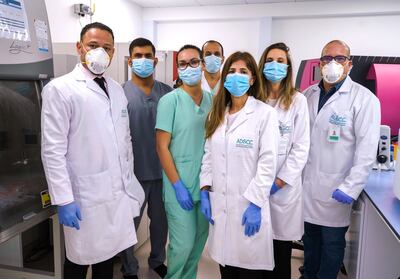When Dr Yendry Ventura began work to set up the Abu Dhabi Stem Cell Centre in late 2018, there was, he says, nothing else "related to stem cell therapy” in the emirate.
Fast forward to today and the situation has changed dramatically. After opening in December last year, the centre has already received international press coverage over to its research into a treatment for Covid-19.
Their groundbreaking work has involved taking stem cells from a patient’s blood and returning them, via a nebuliser, as a fine mist to the lungs.
There they help regenerate lung cells and improve the body's immune response by preventing an overreaction to the infection that can damage healthy cells.
What characterises the method, says Dr Ventura, is that very little manipulation of the cells is needed for the treatment to be effective.
"We separate a specific layer of cells from the blood," Dr Ventura told The National. "We're the first one to use these cells with this route with this method.
“We believe this way the cells can be aimed much better to the affected organs - the upper and lower respiratory tract.”
In April, the centre’s efforts to develop a Covid-19 treatment led to the recovery of all 73 patients the treatment was initially trialled on. A quarter had been in intensive care.
The results appeared so promising that this month the centre secured intellectual property rights to the technique, allowing the treatment to be widely licensed, including to facilities abroad.
The ongoing work exemplifies how the centre’s specialists have been able to apply their expertise “to help in a time of crisis”, Dr Ventura said.
But the new research is a departure from the facility’s usual purpose, which involves developing cutting-edge stem cell treatments for conditions such as cancer and heart disease.
Stem cells were first extracted from humans and grown in laboratories less than a quarter of a century ago.
The human body is mostly made of specialised cell types, such as heart muscle cells, kidney cells or nerve cells, all of which have a particular form related to their function.
Stem cells, however, have not yet undergone the process of developing into a specialised cell type, and are able to be manipulated to perform a specific function.
In adults, stem cells are found in tissues including fat and bone marrow, and these can be turned into cell types.
One technique that the Abu Dhabi Stem Cell Centre plans to implement is haematopoietic stem cell transplantation, which involves stem cells being removed from an individual who is due to have cancer treatment.
The cells are then processed in a laboratory and injected into the patient after they have undergone chemotherapy or radiotherapy.
In this way, they can replace stem cells destroyed by the treatment, allowing a patient to tolerate a higher dose of therapy.
Dr Ventura says that similar treatments were applicable to most cancers of the blood as well as cancers that produce solid tumours.
“There are many of these therapies still in research stage, but if you conquer this research, you can have a programme in which you can ... treat many kinds of cancers at the same time in one centre,” he said.
“The reality is that cell therapy is curing cancer … We need to improve this therapy and make it available for many other people.
“The future for the stem cells lies in regenerative medicine, in which you can treat almost all the degenerative conditions.
“You can create in the future, if you have the right technologies, even artificial organs.”
Set up with private sector funding in collaboration with the UAE authorities, the Abu Dhabi Stem Cell Centre works closely with experts at Sheikh Khalifa Medical City.
But the institution is keen to forge further partnerships with both public and private sector medical institutions.
Currently, it operates seven days a week and has more than 100 staff, including nurses, technicians and doctors who specialise in immunology, haematology, pathology, orthopaedics, urology and radiology.
In another initiative, the facility has recently begun running Minimal Residual Disease tests, which look at how many malignant cells remain in a patient’s blood or bone marrow.
These tests are useful for people with a variety of blood cancers, including lymphoma, leukaemia and myeloma. But they require fresh samples from the patient, so the lack of UAE testing facilities has, until now, required patients to travel abroad.
“We try to implement the tests here in the Abu Dhabi Stem Cell Centre so that the patient does not need to travel anymore,” said Dr Ventura.














